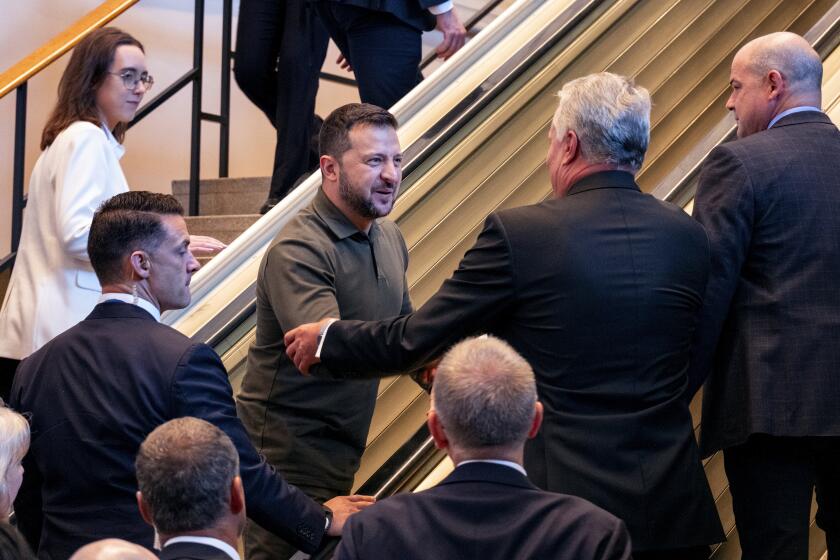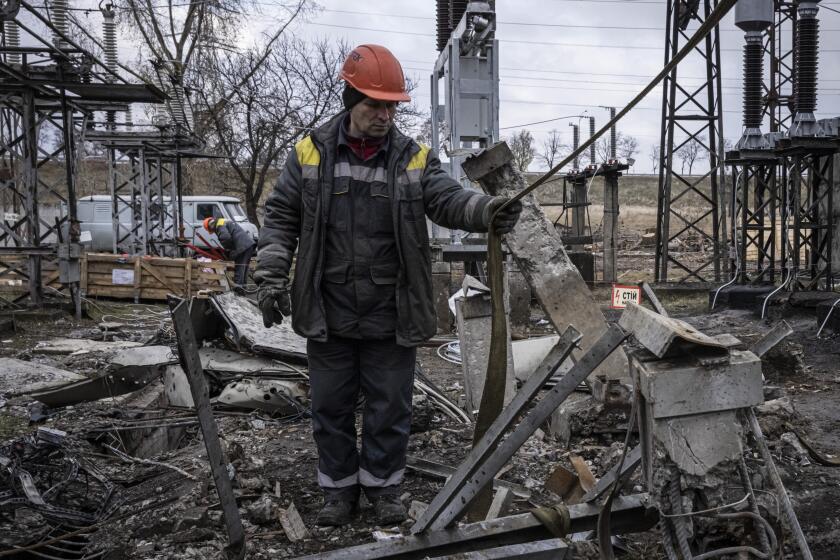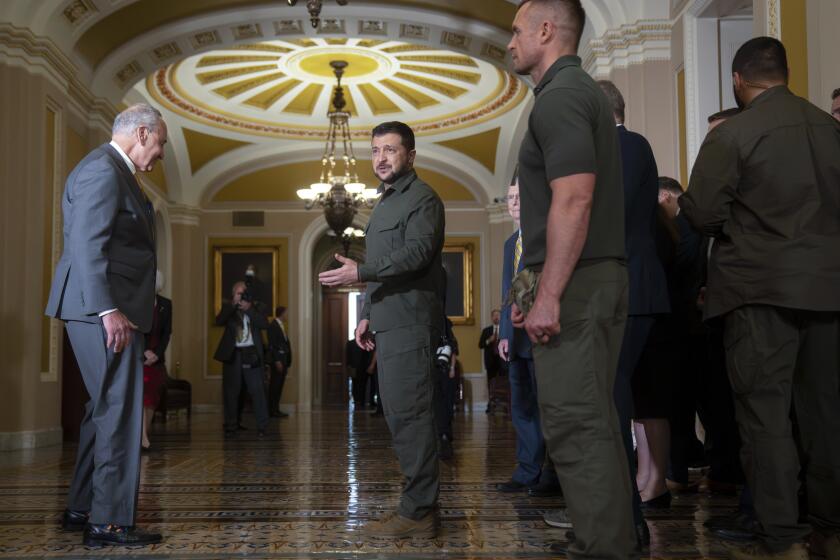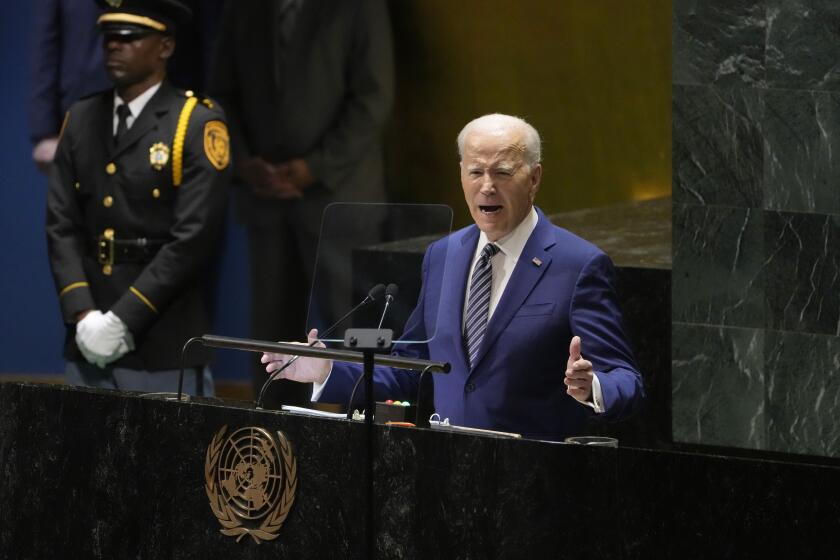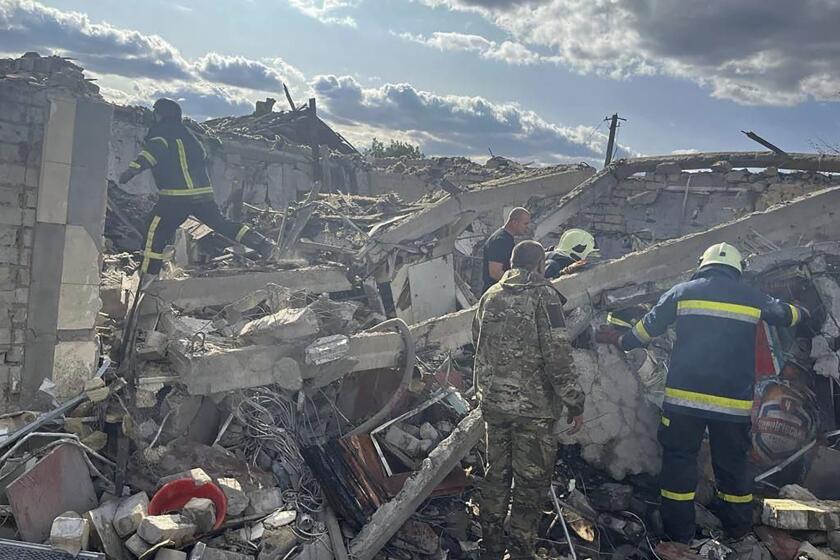How $6 billion in Ukraine aid disappeared from a U.S. funding bill despite wide support in Congress
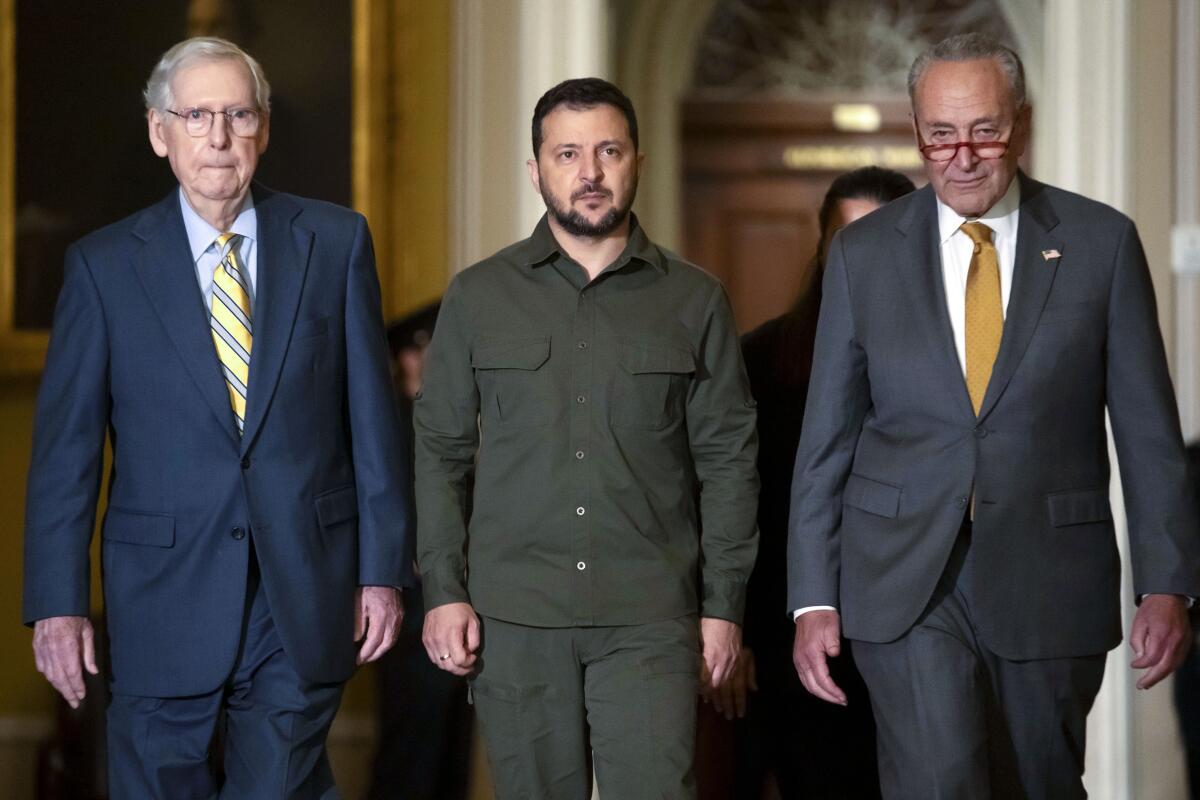
- Share via
WASHINGTON — The collapse of Ukraine aid in Congress was months in the making, and exactly what Senate Republican leader Mitch McConnell had feared.
McConnell had warned that political support for Ukraine was in danger as a small but vocal contingent of fellow Republican lawmakers intensified their efforts against sending U.S. money overseas for the fight against Russia.
First in a series of high-profile speeches this summer, then in direct overtures to the White House, the Republican leader who had visited Kyiv and put a priority on U.S. support for Ukraine tried to steer the hard-right flank of his party.
But in the end, neither McConnell nor the White House nor Democrats in Congress could muscle a scaled-back $6-billion military and civilian aid package for Ukraine to passage in the recent deal to avoid a U.S. government shutdown.
Despite overwhelming bipartisan support in Washington for stopping Russian President Vladimir Putin’s invasion, the failure to approve Ukraine aid was a sizable setback for an administration seeking to lead a Western alliance to protect the young democracy as the fighting grinds on.
It also shows the perils ahead in Washington as a hardened band of Republican lawmakers who are a small minority in Congress — many allied with former President Trump, who is leading polls to be the party’s 2024 nominee — flex their power to overcome the will of the majority. The next steps are highly uncertain.
Even some of Kyiv’s close allies have grumbled that it doesn’t seem sufficiently grateful for the aid it’s received. How thankful is thankful enough?
“It does worry me,” President Biden acknowledged recently. “But I know there are a majority of members in the House and Senate — both parties — who have said that they support funding Ukraine.”
Biden said he is preparing to deliver a major speech on U.S. aid to Ukraine and has a plan in the works to ensure the flow of assistance after the upheaval on Capitol Hill, which was punctuated by the ouster of House Speaker Kevin McCarthy (R-Bakersfield) on Tuesday.
As Washington regroups, the sudden shift has unleashed political blame over the inability of the White House and Congress to work around the small but intensifying minority of lawmakers who are putting aid in jeopardy.
“Not another penny for Ukraine!” wrote Republican Rep. Marjorie Taylor Greene of Georgia, a top Trump ally, arguing that money should be spent on securing the U.S. border with Mexico instead.
McConnell, the Republican leader from Kentucky, had been trying to build support for Ukraine for months, ever since he met with Ukrainian President Volo-dymyr Zelensky in Kyiv in May.
Russian attacks plunged Ukrainian cities into darkness last winter. War-weary citizens brace for more blackouts amid a rush to protect Ukraine’s electrical grid.
The senator gave repeated floor speeches, talked with allies overseas and made the case his priority among colleagues on Capitol Hill, where Zelensky received a hero’s welcome last year and visited with a follow-up appeal weeks before the funding showdown.
But after the White House announced Biden’s $24-billion request for Ukraine aid in August, McConnell knew it would not have the support needed to pass, according to a person familiar with the situation and granted anonymity to discuss it.
McConnell had met with a group of Republican defense hawks in the Senate before the end of September deadline to fund the government or risk a shutdown, which would typically be the time to also pass the White House’s spending request for Ukraine.
Zelensky’s top priority: Make sure the number of Republicans unwilling to continue funding the war effort doesn’t get any bigger.
But the GOP senators left McConnell with the understanding the support for Ukraine funding overall would be lacking.
A week before the deadline, McConnell told Biden’s national security advisor, Jake Sullivan, on a Friday call that it “would be impossible” for Congress to pass the full $24-billion request, said the person familiar with the situation.
At the United Nations, Biden and Zelensky sought to convince developing nations weary of a protracted fight in Ukraine to continue global support for Kyiv.
Instead, McConnell encouraged the White House to look “strongly” at whether it could rely on sending Ukraine aid through existing ways for transferring or reprogramming money in the short term, the person said.
The White House, in conversations with McConnell’s team over the weekend, considered smaller amounts of funding and insisted that the Ukraine aid was vital.
McConnell agreed to do what he could. Days later the Senate advanced its package to keep the government open for the short term, until Nov. 17, with $6 billion for Ukraine. It passed the Senate on an overwhelmingly bipartisan vote.
The problem was, however, that the Democratic leaders on Capitol Hill had never fully articulated Ukraine as a top priority as they fought off House Republican demands for steep budget cuts to keep the government open.
And McCarthy was having his own problems in the Republican-led House.
Greene and other hard-liners in the House had essentially forced McCarthy to strip a much smaller amount of Ukraine security assistance funds, $300 million, from an annual defense funding bill.
It was a stark example of how a growing flank of the party — some 100 Republicans — was wresting control from the majority who widely supported the bill.
It was a sign of the trouble to come.
Staring down a potentially devastating government shutdown, the embattled McCarthy then stripped the $6-billion Ukraine aid from the federal funding package before the House vote to keep the U.S. government open.
As the House was preparing Sept. 30 to avert a shutdown, McConnell convened his Republican senators behind closed doors for a lunch meeting.
At least 51 people were killed in a Russian rocket strike on a village cafe and store in eastern Ukraine, one of the deadliest attacks in recent months.
He spoke of the need to retain the Ukraine aid in the final package, but it was clear the room was not with him.
South Dakota Sen. John Thune, the Republicans’ second in command, had been in talks with McCarthy, including that morning, and understood from the speaker that the package could not pass with the Ukraine aid attached.
Thune told the Republican senators he thought they should move forward with the House version, without the Ukraine money, as the best way to avoid a shutdown, according to a Republican familiar with the private meeting and granted anonymity to discuss it.
The third-ranking GOP senator, John Barrasso of Wyoming, swiftly agreed, according to another Republican granted anonymity to discuss the conversation.
Listening to his colleagues, McConnell then shifted course.
He came out after lunch and said the Republicans would vote against advancing the Senate bill as they waited to see what their House colleague would do.
That afternoon, the House approved the package hours before the midnight deadline to keep government open. The Ukraine aid was dropped.
Gone from the final bill was not only the $6 billion in Ukraine assistance, but also pages of text outlining the ability to transfer funds to Ukraine.
It was just what McConnell had been trying to avoid.
In the aftermath, the White House made it clear that McCarthy had made a commitment on Ukraine beyond what was in the package.
But when reporters asked McCarthy about it, the speaker said there’s no “secret deal” with Biden on Ukraine.
What there was, McCarthy explained, was an assurance that the ability to transfer funds for Ukraine would remain intact. If there was any confusion about that, he said, “we’ll fix it.”
The next day, McCarthy was ousted from the office over long-simmering complaints about his leadership, leaving any fix for Ukraine funding uncertain.
Biden’s speech about Ukraine aid is coming. The White House is waiting for the House to elect a new speaker. And it’s working with Congress to ensure the transferability of funds and to provide new support for Ukraine.
More to Read
Get the L.A. Times Politics newsletter
Deeply reported insights into legislation, politics and policy from Sacramento, Washington and beyond. In your inbox three times per week.
You may occasionally receive promotional content from the Los Angeles Times.
